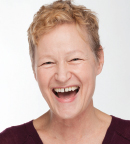Looking back, I’m haunted by what might have been if my advanced non–small cell lung cancer (NSCLC) had been caught in its earliest stage, when perhaps a cure was possible. I certainly presented my physicians with enough clues—shortness of breath, coughing, and some body weakness—to have warranted a more thorough examination than the routine ones I received. But when my symptoms first appeared 14 years ago, I was just 42 and a never smoker, so lung cancer was not on my physicians’ radar screen. Instead, I was diagnosed with adult-onset asthma and was even tested for multiple sclerosis.
When my symptoms didn’t abate and my complaints grew, a neurologist I was seeing asked me if I knew the definition of hypochondria. I’m glad that there is so much greater awareness today of the risk of lung cancer in young adults who have never smoked, and I hope it leads to earlier diagnosis and more potential cures for the disease.
Reprieve From Death
When I was finally diagnosed with stage IB NSCLC in 2005, the tumor was confined to my lower left lobe and was 5 cm. After a bad experience with the oncologist who had diagnosed me, I switched my care to Thomas J. Lynch, Jr, MD (now CEO and Chairman of Massachusetts General Physicians Organization). I’m sure the decision saved my life.
After undergoing surgery to remove the lower lobe of my left lung, I was prescribed four rounds of a combination regimen of docetaxel and cisplatin chemotherapy to kill any errant malignant cells and potentially cure my disease. Unfortunately, that was not the result.
I was unresponsive to the chemotherapy, and within months, tumors began invading both lungs, and my cancer was reclassified to stage IV. By 2008, with few other treatment options to deploy and the cancer rapidly advancing, I was told I had 3 to 5 months to live. To prepare both my young son, just 11 at the time, and myself for my impending death, we started counseling, and I made a cross-country trip to say my goodbyes to relatives. Then I got a reprieve from death.
Exceptional Responder
A biopsy of one of my tumors used for genetic sequencing revealed I was positive for the fusion oncogene anaplastic lymphoma kinase (ALK). In October 2008, I became the fourth person in the world with NSCLC to take the then-experimental drug crizotinib (Xalkori). By now, in the fourth month of my 5-month life expectancy, I had hoped the drug would buy me a few more weeks to spend with my family; instead it gave me 3 years of high-quality life before I became resistant to it and the chance to enroll in a phase I study investigating another ALK inhibitor ceritinib (Zykadia).
Although I didn’t get as long a delay from disease progression with ceritinib as I did with crizotinib, it bought me enough time to enter a phase I trial for the next-generation ALK/ROS1 tyrosine kinase inhibitor lorlatinib
(PF-06463922), which I still take today. Although the drug has given me 2 years of disease stability, there are now signs of cancer progression. However, my current oncologist, Alice Shaw, MD, PhD (Attending Physician in the Thoracic Cancer Program at Massachusetts General Hospital), is already mapping out the next course of action, and I’m relieved to know I still have options.
Learning to Live With Uncertainty
When I was first diagnosed 11 years ago, I never expected to have the chance to grow old, and now I’m not so sure. New therapies could be discovered, giving me many additional years. The way I’ve coped with my diagnosis is that I’ve learned to live with uncertainty and am grateful for every day.

It is an extraordinary honor to have such dedicated physicians working so hard to keep me alive. And I’m not wasting their effort.— Linnea Olson
Tweet this quote
And having this past decade has been more rewarding than I could have imagined. Even though being diagnosed with cancer at such a young age was a real loss of innocence for me, it also gave me great strength. Before cancer, I was a person who often said “I can’t” to a challenge. Now I look at everything before me and say “I can.”
This spring, I watched my youngest child graduate from high school, and this fall he will be a student at the Massachusetts Institute of Technology, where he will study human biology with an emphasis on cancer research. Maybe someday he will be among the next generation of medical innovators to advance cures for cancer.
Making Every Day Count
I know the reason I’m still alive is not just the good fortune of being the recipient of cutting-edge research and treatment advances. It is also because I have had the privilege of having brilliant and caring oncologists who continue to guide me over foreign terrain and make me feel safe even while living with a terminal cancer. It is an extraordinary honor to have such dedicated physicians working so hard to keep me alive. And I’m not wasting their effort.
When I was first diagnosed, the thought of dying was especially sad for me because I didn’t feel I had accomplished enough in my life to leave behind a complete legacy. Content to sit on the sidelines before my diagnosis, I now embrace every aspect of life. I’ve become a staunch advocate for patients’ rights and work to increase funding for cancer research, and the work is rewarding. Today my focus is not on curing my cancer, but on living a high-quality life with my disease. ■
Ms. Olson is an artist, blogger, and cancer survivor advocate. She lives in Lowell, Massachusetts.

